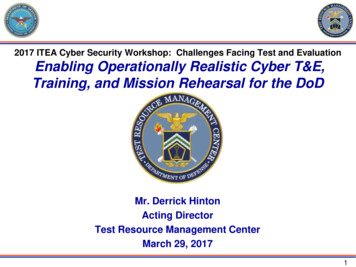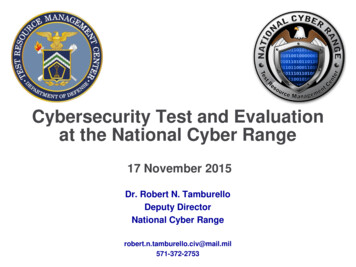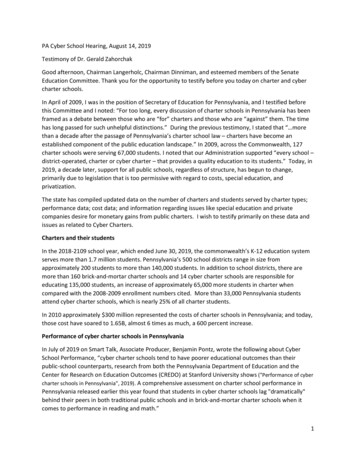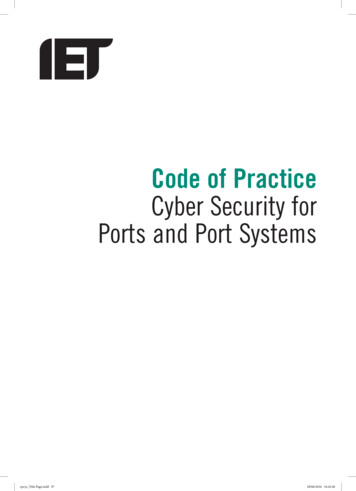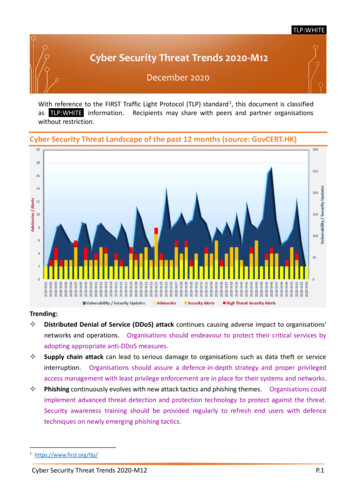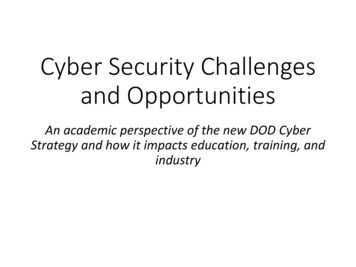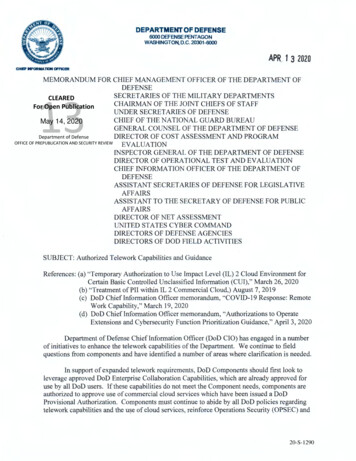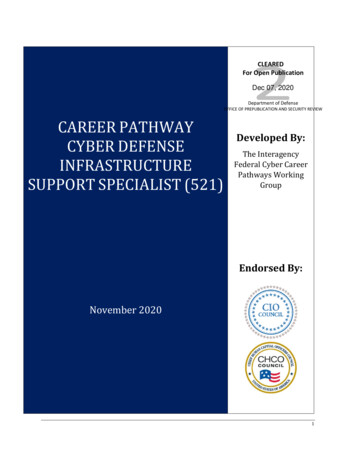
Transcription
CLEAREDFor Open PublicationDec 07, 2020Department of DefenseOFFICE OF PREPUBLICATION AND SECURITY REVIEWCAREER PATHWAYCYBER DEFENSEINFRASTRUCTURESUPPORT SPECIALIST (521)Developed By:The InteragencyFederal Cyber CareerPathways WorkingGroupEndorsed By:November 20201
Table of ContentsCAREER PATHWAY CYBER DEFENSE INFRASTRUCTURE SUPPORT SPECIALIST (521) . 11521-CYBER DEFENSE INFRASTRUCTURE SUPPORT SPECIALIST . 31.1Work Role Overview . 31.2Core Tasks. 51.3Core Knowledge, Skills, and Abilities . 61.4Core Competencies. 81.5Suggested Qualifications / Capability Indicators . 102APPENDIX: 521-CYBER DEFENSE INFRASTRUCTURE SUPPORT SPECIALIST TASKANALYSIS AND KSA MAPPING .112.1Key to Reading the Task Analysis and KSA Mapping . 112.2521-Cyber Defense Infrastructure Support Specialist Task Analysis and KSA Mapping. 122
1 521-CYBER DEFENSE INFRASTRUCTURE SUPPORTSPECIALIST1.1 WORK ROLE OVERVIEWThe table below provides an overview of various role-specific elements related to 521-Cyber DefenseInfrastructure Support Specialist.Table 1. 521-Cyber Defense Infrastructure Support Specialist Work Role OverviewNICE Role DescriptionOPM OccupationalSeriesTests, implements, deploys, maintains, and administers infrastructure hardware andsoftware.Personnel performing the 521-Cyber Defense Infrastructure Support Specialist workrole are most commonly aligned to the following Occupational Series (Top 5 shown):-2210-Information Technology – 79%2504-Wire Communications Cable Splicing – 5%391-Telecommunications – 5%1550-Computer Science – 3%0855-Electronics Engineering – 3%Personnel performing the 521-Cyber Defense Infrastructure Support Specialist work role are mostcommonly paired with the following complimentary Work Roles (Top 5 shown):Work Role Pairings-541-Vulnerability Assessment Analyst - 19%451-System Administrator – 16%411-Technical Support Specialist – 13%441-Network Operations Specialist – 12%531-Cyber Defense Incident Responder – 10%Personnel performing the 521-Cyber Defense Infrastructure Support Specialist work role mayunofficially or alternatively be called:Functional TitlesDistribution of GSLevels-Continuous Diagnostics and Mitigation SpecialistContinuous Monitoring SpecialistCyber Defense Engineer / AdministratorCyber Tool Engineer / AdministratorDisaster Recovery / Emergency Management SpecialistIntrusion Detection System Administrator / TechnicianNetwork Security Specialist / EngineerSystems Security Administrator / EngineerTrusted Internet Connection (TIC) Gateway EngineerPersonnel performing the 521-Cyber Defense Infrastructure Support Specialist work role are mostcommonly found within the following grades on the General Schedule*.- GS-5 – redacted**- GS-7 – redacted**- GS-9 – 7%3
- GS-10 – redacted** GS-11 – 13% GS-12 – 26% GS-13 – 28% GS-14 – 13% GS-15 – redacted***23% of all 521s are in non-GS pay plans and excluded from this section**Percentages below 3% are redacted.The following work roles are examples of possible roles an individual may perform prior totransitioning into the 521-Cyber Defense Infrastructure Support Specialist work role:On Ramps-441-Network Operations Specialist451-System Administrator461-Systems Security Analyst511-Cyber Defense Analyst671-System Testing and Evaluation SpecialistThe following work roles are examples of common transitions an individual may pursue after havingperformed the 521-Cyber Defense Infrastructure Support Specialist. This is not an exhaustive list, nordoes it consider learning and development opportunities an individual may pursue to preparethemselves for performing alternate work roles:-Off Ramps212-Cyber Defense Forensics Analyst531-Cyber Defense Incident Responder541-Vulnerability Assessment Analyst722-Information Systems Security Manager*Note: Leveraging the knowledge, skills, abilities, and tasks of the 521-Cyber Defense InfrastructureSupport Specialist work role, individuals may prepare themselves to transition into one or more of thefollowing cross-functional work roles:-711- Cyber Instructional Curriculum Developer712-Cyber Instructor751-Cyber Workforce Developer and Manager752-Cyber Policy and Strategy Planner802-IT Project Manager803-Product Support Manager4
1.2 CORE TASKSThe table below provides a list of tasks that represent the Core, or baseline, expectations forperformance in the 521-Cyber Defense Infrastructure Support Specialist work role, as well as additionaltasks that those in this role may be expected to perform.Table 2. 521-Cyber Defense Infrastructure Support Specialist Core TasksTask kAssist in identifying, prioritizing, and coordinating the protection of critical cyber defenseinfrastructure and key resources.Build, install, configure, and test dedicated cyber defense hardware.Administer test bed(s), and test and evaluate applications, hardware infrastructure,rules/signatures, access controls, and configurations of platforms managed by serviceprovider(s).Create, edit, and manage network access control lists on specialized cyber defense systems(e.g., firewalls and intrusion prevention systems).Identify potential conflicts with implementation of any cyber defense tools (e.g., tool andsignature testing and optimization).Implement Risk Management Framework (RMF)/Security Assessment and Authorization(SA&A) requirements for dedicated cyber defense systems within the enterprise, anddocument and maintain records for them.Coordinate with Cyber Defense Analysts to manage and administer the updating of rules andsignatures (e.g., intrusion detection/protection systems, antivirus, and content blacklists) forspecialized cyber defense applications.Perform system administration on specialized cyber defense applications and systems (e.g.,antivirus, audit and remediation) or Virtual Private Network (VPN) devices, to includeinstallation, configuration, maintenance, backup, and restoration.Assist in assessing the impact of implementing and sustaining a dedicated cyber defenseinfrastructure.Core or onalAdditional5
1.3 CORE KNOWLEDGE, SKILLS, AND ABILITIESThe table below provides a ranking of KSAs that represent the Core, or baseline, expectations forperformance in the 521-Cyber Defense Infrastructure Support Specialist work role, as well as additionalKSAs that those in this role may be expected to demonstrate.Table 3. 521-Cyber Defense Infrastructure Support Specialist Core Knowledge, Skills, and AbilitiesKSAIDK0004K0005Knowledge of laws, regulations, policies, and ethics as they relate tocybersecurity and privacy.Knowledge of risk management processes (e.g., methods for assessingand mitigating risk).Knowledge of cyber threats and vulnerabilities.K0006Knowledge of specific operational impacts of cybersecurity lapses.Vulnerabilities AssessmentK0157Knowledge of cyber defense and information security policies,procedures, and regulations.Knowledge of Intrusion Detection System (IDS)/Intrusion PreventionSystem (IPS) tools and applications.Skill in troubleshooting and diagnosing cyber defense infrastructureanomalies and work through resolution.Knowledge of Virtual Private Network (VPN) security.Knowledge of incident response and handling methodologies.Knowledge of cybersecurity and privacy principles and organizationalrequirements (relevant to confidentiality, integrity, availability,authentication, non-repudiation).Knowledge of host/network access control mechanisms (e.g., accesscontrol list, capabilities lists).Knowledge of network security architecture concepts includingtopology, protocols, components, and principles (e.g., application ofdefense-in-depth).Knowledge of computer networking concepts and protocols, andnetwork security methodologies.Knowledge of network protocols such as TCP/IP, Dynamic HostConfiguration, Domain Name System (DNS), and directory services.Knowledge of network traffic analysis (tools, methodologies,processes).Knowledge of test procedures, principles, and methodologies (e.g.,Capabilities and Maturity Model Integration (CMMI)).Computer Network DefenseImportance toWork RoleFoundational toAll Work RolesFoundational toAll Work RolesFoundational toAll Work RolesFoundational toAll Work RolesFoundational toAll Work RolesCoreComputer Network DefenseCoreComputer Network DefenseCoreEncryptionIncident ManagementInformation AssuranceCoreCoreCoreInformationSystems/Network SecurityInformationSystems/Network SecurityCoreInfrastructure DesignCoreInfrastructure DesignCoreNetwork ManagementCoreProcess wledge of cybersecurity and privacy principles.InformationSystems/Network SecurityLegal, Government, andJurisprudenceRisk ManagementVulnerabilities AssessmentCore6
KSAIDK0106DescriptionKnowledge of what constitutes a network attack and a networkattack’s relationship to both threats and vulnerabilities.K0021 Knowledge of data backup and recovery.S0053 Skill in tuning sensors.S0079 Skill in protecting a network against malware. (e.g., NIPS, anti-malware,restrict/prevent external devices, spam filters).S0059 Skill in using Virtual Private Network (VPN) devices and encryption.S0054 Skill in using incident handling methodologies.S0367 Skill to apply cybersecurity and privacy principles to organizationalrequirements (relevant to confidentiality, integrity, availability,authentication, non-repudiation).A0123 Ability to apply cybersecurity and privacy principles to organizationalrequirements (relevant to confidentiality, integrity, availability,authentication, non-repudiation).S0007 Skill in applying host/network access controls (e.g., access control list).S0077Skill in securing network communications.K0061Knowledge of how traffic flows across the network (e.g., TransmissionControl Protocol [TCP] and Internet Protocol [IP], Open SystemInterconnection Model [OSI], Information Technology InfrastructureLibrary, current version [ITIL]).Knowledge of network traffic analysis methods.Knowledge of basic system, network, and OS hardening techniques.Skill in system, network, and OS hardening techniques. (e.g., removeunnecessary services, password policies, network segmentation,enable logging, least privilege, etc.).Knowledge of transmission records (e.g., Bluetooth, Radio FrequencyIdentification (RFID), Infrared Networking (IR), Wireless Fidelity (Wi-Fi).paging, cellular, satellite dishes, Voice over Internet Protocol (VoIP)),and jamming techniques that enable transmission of undesirableinformation, or prevent installed systems from operating correctly.K0058K0205S0121K0274Vulnerabilities AssessmentImportance toWork RoleCoreBusiness ContinuityComputer Network DefenseComputer Network ident ManagementInformation AssuranceAdditionalAdditionalAdditionalInformation AssuranceAdditionalInformationSystems/Network SecurityInformationSystems/Network SecurityInfrastructure DesignAdditionalNetwork ManagementSystem AdministrationSystem al7
1.4 CORE COMPETENCIESThe table below is a compilation of competencies aligned to the 521-Cyber Defense InfrastructureSupport Specialist work role, and their associated importance. Listed competencies are collections ofthree or more similar Knowledge, Skills, or Abilities aligned to the Work Role. These competenciesoriginate from the NICE Framework Competency Pivot Tool.Table 4. 521-Cyber Defense Infrastructure Support Specialist Core nseCompIDDefinitionC007KSAs that relate to thedefensive measures to detect,respond, and protectinformation, informationsystems, and networks fromthreats.Work Role Related KSAs---InformationAssuranceInformationSystems /NetworkSecurityC022C024KSAs that relate to themethods and procedures thatprotect information systemsand data by ensuring theiravailability, authentication,confidentiality, and integrity.KSAs that relate to themethods, tools, andprocedures, includingdevelopment of informationsecurity plans to preventinformation systemsvulnerabilities and to provideor restore security ofinformation systems andnetwork services.-----ImportanceKnowledge of cyber defense and information securitypolicies, procedures, and regulations.Knowledge of Intrusion Detection System(IDS)/Intrusion Prevention System (IPS) tools andapplications.Skill in troubleshooting and diagnosing cyber defenseinfrastructure anomalies and work throughresolution.Knowledge of cybersecurity and privacy principlesand organizational requirements (relevant toconfidentiality, integrity, availability, authentication,non-repudiation).Skill to apply cybersecurity and privacy principles toorganizational requirements (relevant toconfidentiality, integrity, availability, authentication,non-repudiation).Ability to apply cybersecurity and privacy principlesto organizational requirements (relevant toconfidentiality, integrity, availability, authentication,non-repudiation).CoreCoreKnowledge of cybersecurity and privacy principles.Knowledge of host/network access controlmechanisms (e.g., access control list, capabilitieslists).Knowledge of network security architecture conceptsincluding topology, protocols, components, andprinciples (e.g., application of defense-in-depth).Skill in applying host/network access controls (e.g.,access control list).Skill in securing network communications.Core8
tiesAssessmentCompIDDefinitionC026KSAs that relate to thearchitecture and typology ofsoftware, hardware, andnetworks, including LANS,WANS, andtelecommunications systems,their components andassociated protocols andstandards, and how theyoperate and integrate withone another and withassociated controllingsoftware.C057KSAs that relate to theprinciples, methods, and toolsfor assessing vulnerabilitiesand developing orrecommending appropriatemitigation countermeasures.Work Role Related KSAs----ImportanceKnowledge of computer networking concepts andprotocols, and network security methodologies.Knowledge of network protocols such as TCP/IP,Dynamic Host Configuration, Domain Name System(DNS), and directory services.Knowledge of how traffic flows across the network(e.g., Transmission Control Protocol [TCP] andInternet Protocol [IP], Open System InterconnectionModel [OSI], Information Technology InfrastructureLibrary, current version [ITIL]).CoreKnowledge of cyber threats and vulnerabilities.Knowledge of specific operational impacts ofcybersecurity lapses.Knowledge of what constitutes a network attack anda network attack’s relationship to both threats andvulnerabilities.Knowledge of packet-level analysis.Additional9
1.5 SUGGESTED QUALIFICATIONS / CAPABILITY INDICATORSTable 5. 521-Cyber Defense Infrastructure Support Specialist Suggested Qualifications / Capability IndicatorsFor indicators of capability for the 521-Cyber Defense Infrastructure Support Specialist work role, pleasesee Draft NISTR 8193 - National Initiative for Cybersecurity Education (NICE) Framework Work RoleCapability Indicators.Section to be populated with updated DoD-8140 Qualification Matrix for 521-Cyber DefenseInfrastructure Support Specialist.10
2 APPENDIX: 521-CYBER DEFENSE INFRASTRUCTURESUPPORT SPECIALIST TASK ANALYSIS AND KSAMAPPING2.1 KEY TO READING THE TASK ANALYSIS AND KSA MAPPINGTable 6. Key to Reading the Task Analysis and KSA MappingProficiencyAs WrittenEntryIntermediateAdvancedTask StatementTask as written within the NICE Cybersecurity Workforce Framework (NICE Framework).ImportanceOverall Importance to WorkRoleExample behavioral indicator / task permutation for performing this task at an Entry skills proficiency level.Example behavioral indicator / task permutation for performing this task at an Intermediate skills proficiency level.Example behavioral indicator / task permutation for performing this task at an Advanced skills proficiency level.Table 7. Primary Knowledge, Skills, and Abilities Required to Perform the above TaskKSA IDDescriptionCompetencyID of K, S, or AKnowledge, Skill or Ability needed to perform the task as written within the NICE FrameworkCompetency mapped to theindividual K, S, or A.11
2.2 521-CYBER DEFENSE INFRASTRUCTURE SUPPORT SPECIALIST TASK ANALYSIS ANDKSA MAPPINGTable 8. T0042 Task AnalysisProficiencyAs k StatementImportanceCoordinate with Cyber Defense Analysts to administer existing rules and signaturesCore(e.g., intrusion detection/protection systems, antivirus, and content blacklists) forspecialized cyber defense applications, including responding to alerts.Coordinate with Cyber Defense Analysts to administer existing rules and signatures (e.g., intrusiondetection/protection systems, antivirus, and content blacklists) for specialized cyber defense applications,including responding to alerts.Coordinate with Cyber Defense Analysts to administer existing rules and signatures (e.g., intrusiondetection/protection systems, antivirus, and content blacklists) for specialized cyber defense applications,including responding to alerts.Coordinate with Cyber Defense Analysts to administer existing rules and signatures (e.g., intrusiondetection/protection systems, antivirus, and content blacklists) for specialized cyber defense applications,including responding to alerts.Table 9. Primary Knowledge, Skills, and Abilities Required to Perform the above TaskKSA IDDescriptionK0033Knowledge of host/network access control mechanisms (e.g., access control list,capabilities lists).K0058Knowledge of network traffic analysis methods.K0061Knowledge of how traffic flows across the network (e.g., Transmission ControlProtocol [TCP] and Internet Protocol [IP], Open System Interconnection Model[OSI], Information Technology Infrastructure Library, current version [ITIL]).Knowledge of web filtering technologies.Knowledge of network security architecture concepts including topology,protocols, components, and principles (e.g., application of defense-in-depth).K0135K0179K0324S0007Knowledge of Intrusion Detection System (IDS)/Intrusion Prevention System (IPS)tools and applications.Knowledge of network protocols such as TCP/IP, Dynamic Host Configuration,Domain Name System (DNS), and directory services.Skill in applying host/network access controls (e.g., access control list).S0053Skill in tuning ecurityNetworkManagementInfrastructure DesignWeb er NetworkDefenseInfrastructure DesignInformationSystems/NetworkSecurityComputer NetworkDefense12
S0077Skill in securing network communications.S0079Skill in protecting a network against malware. (e.g., NIPS, anti-malware,restrict/prevent external devices, spam filters).Skill in troubleshooting and diagnosing cyber defense infrastructure anomalies andwork through Computer NetworkDefenseComputer NetworkDefense13
Table 10. T0180 Task AnalysisProficiencyAs k StatementImportancePerform system administration on specialized cyber defense applications andsystems (e.g., antivirus, audit and remediation) or Virtual Private Network (VPN)Coredevices, to include installation, configuration, maintenance, backup, andrestoration.Under supervision, install and configure specialized cyber defense applications, systems (e.g., antivirus,audit and remediation) and hardware devices, to include maintenance, backup, and restoration.Perform system administration on specialized cyber defense applications, systems (e.g., antivirus, audit andremediation) and hardware devices, to include installation, configuration, maintenance, backup, andrestoration.Oversee the administration and integration of specialized cyber defense applications and systems, whileserving as an escalation point of contact for the organization.Table 11. Primary Knowledge, Skills, and Abilities Required to Perform the above TaskKSA IDK0021K0104K0157K0205K0258DescriptionKnowledge of data backup and recovery.Knowledge of Virtual Private Network (VPN) security.Knowledge of cyber defense and information security policies, procedures, andregulations.Knowledge of basic system, network, and OS hardening techniques.S0007Knowledge of test procedures, principles, and methodologies (e.g., Capabilitiesand Maturity Model Integration (CMMI)).Knowledge of Intrusion Detection System (IDS)/Intrusion Prevention System (IPS)tools and applications.Knowledge of network protocols such as TCP/IP, Dynamic Host Configuration,Domain Name System (DNS), and directory services.Skill in applying host/network access controls (e.g., access control list).S0059S0077Skill in using Virtual Private Network (VPN) devices and encryption.Skill in securing network communications.S0079Skill in protecting a network against malware. (e.g., NIPS, anti-malware,restrict/prevent external devices, spam filters).K0324K0332CompetencyBusiness ContinuityEncryptionComputer NetworkDefenseSystemAdministrationProcess ControlComputer NetworkDefenseInfrastructure InformationSystems/NetworkSecurityComputer NetworkDefense14
Table 12. T0261 Task AnalysisProficiencyAs k StatementAssist in identifying, prioritizing, and coordinating the protection of critical cyberdefense infrastructure and key resources.ImportanceCoreAssist in identifying, prioritizing, and coordinating the protection of critical cyber defense infrastructure andkey resources.Coordinate identifying, prioritizing, and coordinating the protection of critical cyber defense infrastructureand key resources.Lead the identification, prioritization, and coordination the protection of critical cyber defenseinfrastructure and key resources.Table 13. Primary Knowledge, Skills, and Abilities Required to Perform the above TaskKSA IDDescriptionK0033Knowledge of host/network access control mechanisms (e.g., access control list,capabilities lists).K0044Knowledge of cybersecurity and privacy principles and organizationalrequirements (relevant to confidentiality, integrity, availability, authentication,non-repudiation).Knowledge of what constitutes a network attack and a network attack’srelationship to both threats and vulnerabilities.Knowledge of cyber defense and information security policies, procedures, andregulations.Knowledge of network security architecture concepts including topology,protocols, components, and principles (e.g., application of 334S0124S0367Knowledge of test procedures, principles, and methodologies (e.g., Capabilitiesand Maturity Model Integration (CMMI)).Knowledge of Intrusion Detection System (IDS)/Intrusion Prevention System (IPS)tools and applications.Knowledge of network protocols such as TCP/IP, Dynamic Host Configuration,Domain Name System (DNS), and directory services.Knowledge of network traffic analysis (tools, methodologies, processes).Skill in troubleshooting and diagnosing cyber defense infrastructure anomalies andwork through resolution.Skill to apply cybersecurity and privacy principles to organizational requirements(relevant to confidentiality, integrity, availability, authentication, ssmentComputer ocess ControlComputer NetworkDefenseInfrastructure DesignNetworkManagementComputer NetworkDefenseInformationAssurance15
Table 14. T0335 Task AnalysisProficiencyAs k StatementImportanceBuild, install, configure, and test dedicated cyber defense hardware.CoreBuild, install, configure, and test dedicated cyber defense hardware using existing SOPs.Build, install, configure, and test new configurations of dedicated cyber defense hardware and modifyexisting and or create new SOPs.Overseeing and resolving complex designs, builds, installation, configuration, and testing dedicated cyberdefense hardware, while modifying and approving existing or creating new SOPs.Table 15. Primary Knowledge, Skills, and Abilities Required to Perform the above TaskKSA IDDescriptionK0033Knowledge of host/network access control mechanisms (e.g., access control list,capabilities lists).K0042Knowledge of incident response and handling methodologies.K0104K0106Knowledge of Virtual Private Network (VPN) security.Knowledge of what constitutes a network attack and a network attack’srelationship to both threats and vulnerabilities.Knowledge of cyber defense and information security policies, procedures, andregulations.Knowledge of network security architecture concepts including topology,protocols, components, and principles (e.g., application of 079S0124Knowledge of test procedures, principles, and methodologies (e.g., Capabilitiesand Maturity Model Integration (CMMI)).Knowledge of Intrusion Detection System (IDS)/Intrusion Prevention System (IPS)tools and applications.Knowledge of network protocols such as TCP/IP, Dynamic Host Configuration,Domain Name System (DNS), and directory services.Knowledge of network traffic analysis (tools, methodologies, processes).Skill in protecting a network against malware. (e.g., NIPS, anti-malware,restrict/prevent external devices, spam filters).Skill in troubleshooting and diagnosing cyber defense infrastructure anomalies andwork through sessmentComputer ocess ControlComputer NetworkDefenseInfrastructure DesignNetworkManagementComputer NetworkDefenseComputer NetworkDefense16
Table 16. T0348 Task AnalysisProficiencyAs k StatementAssist in assessing the impact of implementing and sustaining a dedicated cyberdefense infrastructure.ImportanceCoreAssist in assessing the impact of implementing and sustaining a dedicated cyber defense infrastructure.Assess the impact of implementing and sustaining a dedicated cyber defense infrastructure.Lead the assessment and oversee the impact of implementing and sustaining a dedicated cyber defenseinfrastructure.Table 17. Primary Knowledge, Skills, and Abilities Required to Perform the above TaskKSA IDDescriptionK0033Knowledge of host/network access control mechanisms (e.g., access control list,capabilities lists).K0042Knowledge of incident response and handling methodologies.K0044Knowledge of cybersecurity and privacy principles and organizationalrequirements (relevant to confidentiality, integrity, availability, authentication,non-repudiation).Knowledge of how traffic flows across the network (e.g., Transmission ControlProtocol [TCP] and Internet Protocol [IP], Open System Interconnection Model[OSI], Information Technology Infrastructure Library, current version [ITIL]).Knowledge of Virtual Private Network (VPN) security.Knowledge of what constitutes a network attack and a network attack’srelationship to both threats and vulnerabilities.Knowledge of cyber defense and information security policies, procedures, andregulations.Knowledge of network security architecture concepts including topology,protocols, components, and principles (e.g., application of 324K0332K0334S0079Knowledge of test procedures, principles, and methodologies (e.g., Capabilitiesand Maturity Model Integration (CMMI)).Knowledge of Intrusion Detection System (IDS)/Intrusion Prevention System (IPS)tools and applications.Knowledge of network protocols such as TCP/IP, Dynamic Host Configuration,Domain Name System (DNS), and directory services.Knowledge of network traffic analysis (tools, methodologies, processes).Skill in protecting a network against malware. (e.g., NIPS, anti-malware,restrict/prevent external devices, spam cture DesignEncryptionVulnerabilitiesAssessmentComputer ocess ControlComputer NetworkDefenseInfrastructure DesignNetworkManagementComputer NetworkDefense17
S0124Skill in troubleshooting and diagnosing cyber defense infrastructure anomalies andwork through resolution.Computer NetworkDefense18
Table 18. T0420 Task AnalysisProficiencyAs k StatementAdminister test bed(s), and test and evaluate applications, hardwareinfrastructure, rules/signatures, access controls, and configurations of platformsmanaged by service provider(s).ImportanceCoreAssist with the administration test bed(s), to test and evaluate cyber defense infrastructure (e.g.applications, hardware infrastructure, virtualized environments, rules/signatures, access control
Interconnection Model [OSI], Information Technology Infrastructure Library, current version [ITIL]). Infrastructure Design Additional K0058 Knowledge of network traffic analysis methods. Network Management Additional K0205 Knowledge of basic system, network, and OS hardening techniques. System Administration Additional


